|
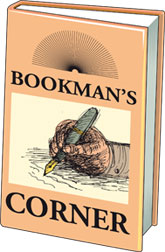
Lyrical expression of Australian poetry
Reviewed by Dr. Siri Galhenage
An accomplished bilingual poet, Sunil Govinnage, gives lyrical
expression to his own migrant experience by writing poetry from
Australia. He does it with sincerity and openness. ‘In the bewildering
host country the ultra-sensitive psyche of the poet, suffered a series
of culture shocks, making creative sparks fly in all directions’, wrote
Kalakeerthi Edwin Ariyadasa, in a review of Govinnage’s anthology of
poetry in Sinhala, Mathaka Pilirav [Echoes of Memory]. The same is a
fitting observation of the current anthology in review.
The book consists of two parts: the collection of poetry by Sunil
Govinnage and two essays by Dr. Thiru Kandiah on Govinnage’s poetry. In
my critique, I have chosen to focus on those poems that relate to the
migrant experience which form the bulk of the collection.
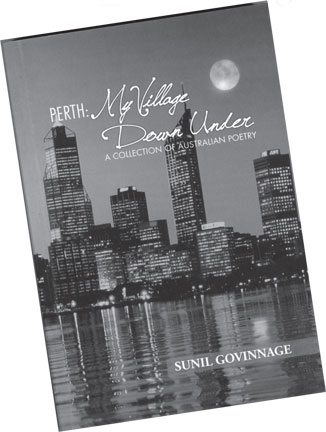 |
|
Perth: My Village Down
Under -A Collection of Australian Poetry’
Author: Sunil Govinnage.
Sarasavi Publishers, Nugegoda |
The theme of loss runs through the collection of poems like an
underground stream. The poet gives expression to his angst in letting go
of his native land, his heritage, his language and his kith and kin. ‘I
was a wingless bird/.Unwilling to leave the nest’. The separation was
too painful; he creates visual imagery of his childhood [‘the paddy
field.../stacking hay after harvest/...chasing sleepy buffaloes...’] and
collects them ‘like jewels on the string of life’ to be carried over to
his ‘village’ across the ocean. His need to maintain continuity is
clear: ‘When the same moon rises/Over the Swan River/, I will pick them
up/ Tomorrow, In my new village; Perth’.
Reasons
Human movement across state borders became commonplace worldwide
after the Second World War, due to a variety of reasons. Ceylon/Sri
Lanka too experienced such migratory activity with many of her citizens
opting to leave her shores after Independence, and more so during the
three decades of hostilities at the turn of the century.
Lured by the popular tag, ‘the lucky country’, many Sri Lankans chose
Australia as their adopted home. The poet and his family were amongst
them, citing ‘concerns for the safety of their children’ as the reason
for leaving their motherland.
‘Breaking free from the fear of war/that hung heavy on the heart’.
They settle down in Perth, where the poet ‘sets up’ his ‘village down
under’.
Needless to say, Perth is no village. Nestled between the Darling
Range of mountains and the ‘mute sea’ [the Indian Ocean] and traversed
by the Swan River, Perth is described as the ‘most isolated capital city
in the world’ – ‘a best kept secret’- with a sprawling suburbia. The
poet uses the term ‘village’ metaphorically, carrying over his original
village – with the nativity, unity and the comfort it represents – and
superimposing it on his new-found habitat. It reminds me of the little
child who carries a cuddly toy [or any other object] for comfort when he
explores the territory around his mother, which Donald Winnicott, the
Paediatrician and Psychoanalyst called the ‘transitional object’! To
Govinnage ‘the village’ is his transitional object.
Ideal
After settling in the new ‘village’ the painful withdrawal from the
lost object, which takes the form of an abstract ideal, continues,
resulting in a state of moaning [grief].
‘I don’t shed any more tears...But my heart aches’;
and the sadness is projected on to his new environment.
‘A sad melody fills..a weeping sky’.
‘A sad melody from a didgeridoo...floats with the wind’.
‘When the moon rises, I can see,/ A yellow veil covering the sad river
again’.
‘The Swan River. .is a tired child/ready to sleep’.
The migratory transition evokes a ‘crisis’ in many migrants,
generating a plethora of emotions. Such emotions arise as a result of
the conflict between the desire to preserve one’s original culture,
language and traditions and transmit them to one’s offspring, and the
need to adapt to the new culture.
The emotions generated depend on the capacity of the individual to
take up such a challenge and are intimately personal.
He maintains a long distance romance with his native land and the
memories flash back triggered by sights in his new environment. ‘Looking
at floating ferries… On the Swan River..Far below. My memory is a
mirror.. I see ferries floating.. On the Kelani River’.
‘Hay Street is full of damsels/Some like apsaras in Sigiri frescoes’.
Isolation
The poet expresses his isolation, with no one to confide in: ‘The
Swan Rive/Flows sadly to the mute Indian Ocean’. At times he lapses into
a state of melancholy:
‘My health is no good./My lungs are packing up./The heart decreases
in rhythm’.
‘I don’t even have enough poems/as a literary bank balance in this
village!’
The poet’s grief is compounded by anger and resentment. He
articulates such emotions in the context of perceived unmet expectations
and thwarted ambitions for him and his family and is displaced onto his
adopted home.
‘Australia!/You are not my country/You were only a shelter/From woes
in my country’
‘You robbed my children /Of their mother tongue/And forced them to
wear a white mask’.
He also gives lyrical expression to the schism that develops between
him and his children as they, in their formative years, adopt the new
culture. This is best symbolised by:
‘I heard you [daughter] asking mum/Whether she had received red
roses/I have never given red roses for love/Or celebrated Valentine’s
Day’/‘We offered flowers to the Buddha/And chanted gatha reflecting
on/The ephemeral nature of life’.
‘I would like to be the Lion/Protecting you in my cave in Sri Lanka!’
The confusion in his mind, created by the mixed emotions, gives rise
to this oxymoronic reaction!
‘Walked as freely as you liked, [in SL] /Even if you did get a bullet
in your head’.
Despair
Having to give up his identity has been a central concern for the
migrant poet: the source of his despair. He gives expression to his
hesitation in pursuing a new identity, resulting in a ‘diffusion’ of his
conception of individuality [Identity Diffusion: a concept developed by
Eric Eriksson, psychologist] although Australia tends to promote the
idea of migrants maintaining their cultural heritage while integrating
into the general community. As a multicultural society Australians takes
pride in their ‘unity in diversity’.
The poet alludes to being an ‘Auslankan’ and an ‘Orientalist from
down under’ with a certain degree of cynicism. The problem lies, as with
many migrants, in the idealisation of the ‘loss object’ and difficulties
experienced in letting go in the initial stages of immigration.
As the poet attempts to adjust to the change of seasons in his new
home, he finds himself projecting his unsettled mindset onto the
climatic conditions.
Summer has arrived /Like an angry man/Looking for a place to cook.
The fallen [autumn] leaves/By the road/Drifting like our lives.
The world covered with sad rain/The winter evenings are crawling/Like a
snake.
The [spring] sun is a teenage rebel/The frozen days have evaporated/
Like my youth.
Voice
As he merges into the Australian community the poet gives a voice to
some of the contentious national political issues in ‘My Big Village:
Australia’.
Aboriginal cause: ‘Killed the blacks/Created a Third World within the
First’
Off-shore processing of refugees: ‘A bi-partisan approach to keep
Australia clean/Of refugees, the boat people reaching our shores
This is not the tradition our white ancestors/Established over two
hundred years ago’
Trade with China:
‘Yes we sell a bit of Australia to China everyday/Until we have no land
and iron ore to sell’.
Aren’t they verses [voices] of dissent?
Despite the initial ambivalence in adopting an Australian identity,
it seems ironical that the poet has subtitled his book ‘A collection of
Australian poetry’. Instead, in my view, a title of ‘A collection of
Migrant Poetry’ would have been more appropriate, as the collection
aptly portrays the feeling state of a migrant, albeit idiosyncratic, for
the reader to reflect upon.
Beauty
But having settled in his village down under, one could hope that the
poet will now give expression to the beauty around him, and with his
undoubted poetic skill, give lyrical expression to a higher level of
understanding of the ‘oneness of beings’, as he has come to live in a
‘village’ which he shares with people from all corners of the world.
After all, we are all travellers on ‘The Great Trunk Road’ to borrow
a metaphor from Rudyard Kipling’s ‘KIM’, taking refuge at ‘villages’
down the track, but soon to pick up our ‘baggage’ and continue with our
‘journey’.
‘One cannot overlook Sunil Govinnage’s unique contribution to the
main-stream of modern Sinhala poetry’[Edwin Ariyadasa]. With this
collection of poetry in English he has expanded his horizons and made
his mark across the ocean.
The Australian poet, Andrew Burke has observed: ‘having Sunil read in
Sinhala was enchanting—imagine such song being multiplied and amplified
a hundredfold in our midst’. With poets such as Govinnage brought into
location, Burke predicts: ‘I see some day there being a distinctly West
Coast OZ literature’.
Book Launch
Ape Kalaye Deshapalakayakuge Kathava
Ariyananda Dombagahawatte's latest Sinhala novel Ape Kalaye
Deshapalakyakuge Kathava will be launched at Dayawansa Jayakody
Bookshop, Colombo 10 on October 12 at 10 a.m.
Dombagahawatte is the author of several other books including T-56
Kathava, Nonimi Geethaya, Elame Kathava and Lova Hellu Maha Pa Gamana.
It is a Dayawansa Jayakody publication.
Nissankamalla Rajathuma
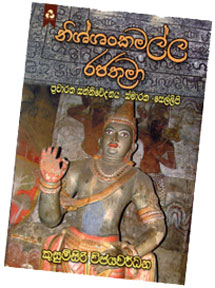
Kusumsiri Wijayawardena's latest book Nissankamalla Rajathuma was
launched at Dayawansa Jayakody bookshop in Colombo recently. It is a
Dayawansa Jayakody publication.
Athma
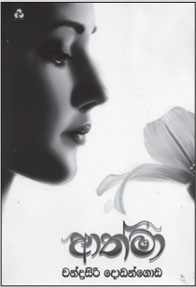
Chandrasiri Dodangoda's latest Sinhala novel Athma was launched at
Dayawansa Jayakody Bookshop, Colombo 10 recently.
Dodangoda is the author of several other novels such as Sathi,
Pujasanaya, Kandulu Dorakada, Sanda Kaluvarai, Visirunu Malpethi,
Dedenek saha Katha Dekak and Lochana.
Athma is a Dayawansa Jayakody publication.
New arrivals
The Muslim Heritage of Eastern Sri Lanka
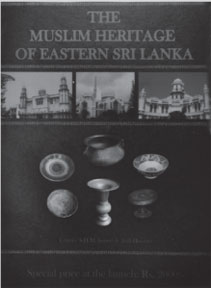
T he Muslim Women's Research and Action Forum launched the Muslim
Heritage of Eastern Sri Lanka at the Sri Lanka Foundation Institute,
Colombo recently. The book edited by S.H.M. Jameel and Asif Hussein is a
record of the traditional society, lifestyle and culture of the Muslims
of the Eastern Province of Sri Lanka.
Nadanna Devduve
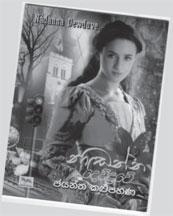
Jayantha Kalupahana's latest Sinhala novel Nadanna Devduve was
launched recently at the International Book Fair, BMICH. It is a Kinkini
Creations publication. |

